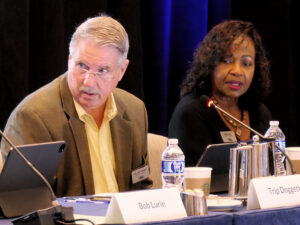FERC has dismissed a complaint the Virginia Municipal Electric Association (VMEA) filed against Dominion Energy’s Virginia Electric Power Co. (VEPCO) alleging the utility overcharged its members $2.8 million (EL24-99).
The commission declined to assert primary jurisdiction over the dispute, which it can do at its own discretion.
VMEA is a wholesale customer of Dominion’s utility, and it argued the improper charges were related to the Regional Greenhouse Gas Initiative. VMEA has a full requirements electric service contract with VEPCO, with includes charges based on a formula rate that includes the Uniform System of Accounts, Account 509, as an input.
VEPCO exceeded the RGGI cap in 2021 and 2022, requiring it to spend $137.7 million and $123.5 million in emissions allowances. The utility recovered $84.2 million of that under a rider the State Corporation Commission (SCC) approved.
The rest of the money, $177.1 million, initially was supposed to be recovered in VEPCO’s 2023 biennial rate review, but VMEA said the utility told state regulators that amount would be “deemed recovered” and would not be recovered in future rates.
VMEA claimed the $177.1 million should not have been included in Account 509. It was, and that led to the claim of being overcharged $2.8 million. The association wanted FERC to order Dominion to implement its formula rate without those charges in the account.
Virginia Power told FERC the SCC never disallowed recovery of the RGGI costs, and they were properly included in the rates charged to its retail customers and wholesale customers like VMEA.
The utility initially recovered RGGI costs through the rider, but it got rid of that once Gov. Glenn Youngkin (R) decided to withdraw from the multistate carbon market that had been entered into under his predecessors.
The SCC allowed VEPCO to recover the $177.1 million in its base generation rates in a June 2022 ruling, the utility told FERC. Its deal with VMEA also allows the utility to recover RGGI costs related to its service.
In declining jurisdiction over the dispute, FERC said it did not have expertise compared to the SCC or a state court to adjudicate the dispute. The issue also does not require any uniformity of interpretation for FERC because the facts are unique to the dispute and the complaint also does not raise any broader policy issues relevant to FERC’s jurisdiction.
“Resolution of this matter does not require the commission to interpret its accounting rules and regulations; rather, the dispute concerns the factual issues related to the specific terms of the agreement and the SCC’s decisions in a series of retail ratemaking orders and proceedings,” FERC said Sept. 19.
Commissioner Mark Christie, who chaired the SCC before taking his position at FERC in January 2021, did not participate in the case.


